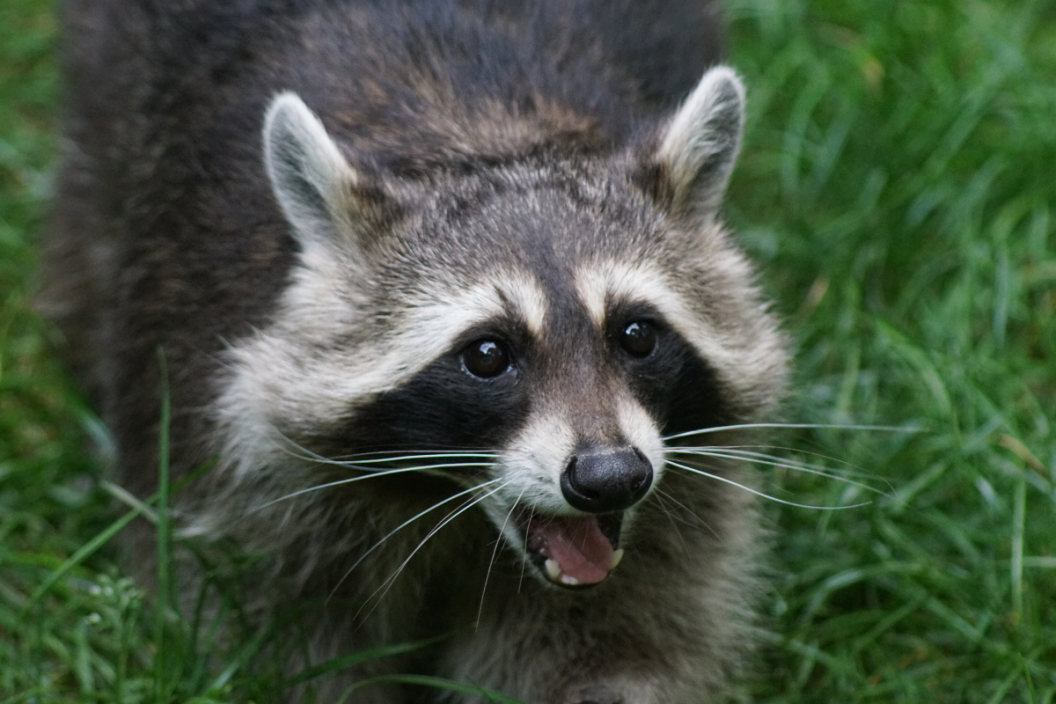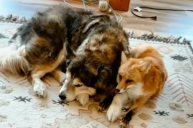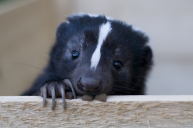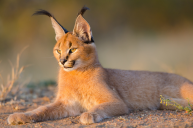Raccoons go by a lot of different names. Trash pandas. Treasure cats. Masked bandits. Pets? Rewind that one. A raccoon as a pet? While it may be rare, it isn't unheard of. Exotic pet ownership is a fascinating topic for many animal lovers, especially animals like foxes and wolves. But, most people view it as more of an observation and don't actually bring wild animals into their homes, raising them like you would a dog or a cat. However, there is a small grouping of animal enthusiasts out there who take one look at their adorable masked faces and tiny t-rex arms and have to have one in their lives. (A similar concept to those who own skunks, I guess.) Raccoons certainly look soft and cuddly, but what really lies behind that fuzzy exterior, and do they really make a good pet? Animated characters like Meeko (from Disney's Pocahontas) definitely perpetuate the clever and huggable aspect of these creatures. Who didn't want a cheeky little raccoon following them around after that movie? Of course, as we all realized, real life is very far from the animated world. Not all animals are meant to be pets, and not every animal wants a human friend.
Despite some of their silly monikers and gross food-forging habits, raccoons are very smart animals who can become very attached to their humans. But these cute little rascals don't always have the best demeanors. In fact, their personalities can be all over the board, ranging from sweet and loveable to downright mean and confrontational. Also, they are wild animals. Wild animals come with a wide variety of bugs, parasites, and diseases. (Not to mention sharp nails!) While they can be great companions, there is a lot to consider about raccoon ownership. Before you get your heart set on your very own Ringo the Raccoon, here are a few things you need to look into first.
Is It Legal To Own A Raccoon?
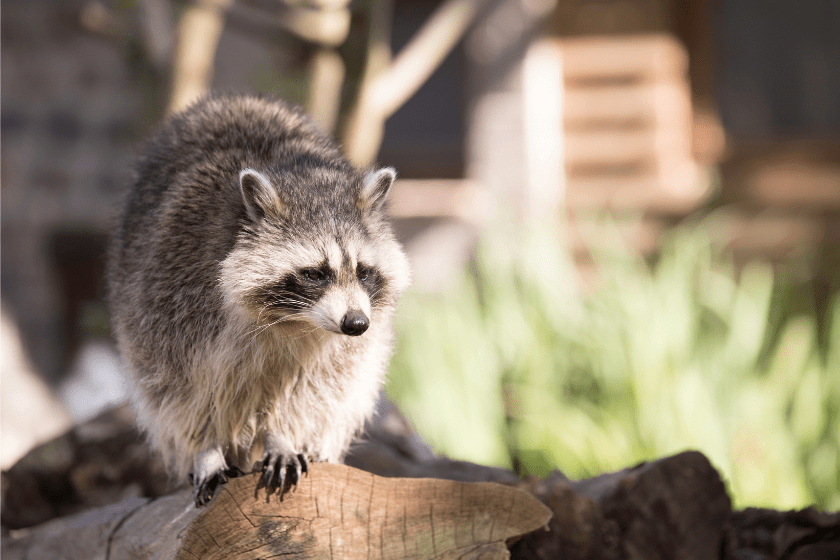
Yes! In many areas of the United States, keeping a captive raccoon as a pet is perfectly legal. However, you should check state and county laws first; Even if your state allows you to keep a raccoon, some city ordinances will prohibit homeowners from keeping these exotic pets.
If they are permitted where you live, the best way to get a pet raccoon is through an established breeder. Raccoons bred and raised in a home with humans can bond more easily and adjust faster to life as domestic animals as opposed to wild raccoons. Wild raccoons should stay right where they are in their natural habitat. Here are the states where it is reportedly legal to own a pet raccoon:
- Arkansas
- Delaware
- Florida
- Indiana
- Nebraska
- North Carolina
- South Carolina
- Michigan
- Oklahoma
- Pennsylvania
- Rhode Island
- Texas
- Virginia
- West Virginia
- Wisconsin
- Wyoming
Keeping Raccoons as Pets
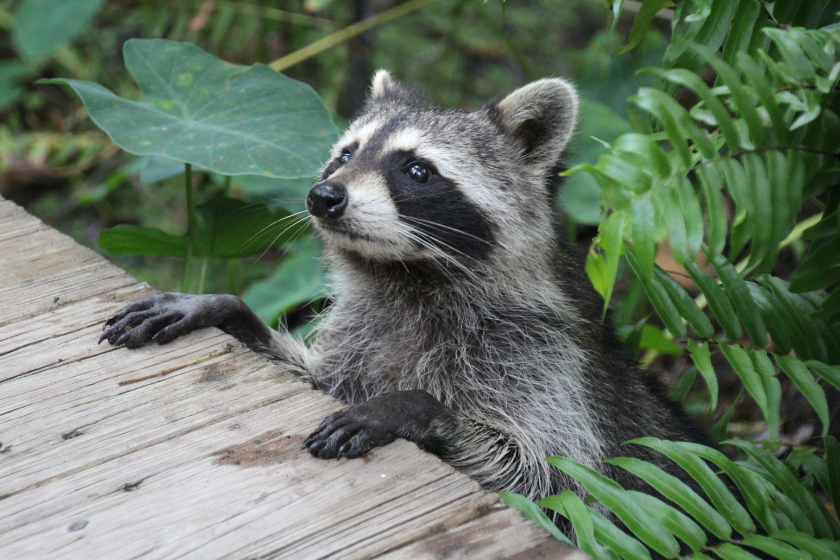

RELATED: Ferrets Make Great Pets, If You Know What To Expect
Raccoons can be remarkably affectionate. They can become very attached to their owners and spend long periods snuggling. However, if they are afraid or become angry, they can and will bite. There have also been accounts of abandoned baby raccoons or young raccoons being good pets, but adult raccoons becoming mean. In this situation, it is best to give the baby raccoon to wildlife control so they can get the help they need from animal experts.
Raccoons are very independent and still have wild instincts. There will be days when they want to play and cuddle all the time and others where they want to treat to their own space. Because of that, they usually need a full room inside or an outdoor enclosure that is entirely theirs. In addition, they need plenty of toys to keep them occupied, bedding, and things to climb on and explore.
If they are not given enough space to roam and enough toys to play with, they can become very destructive and inquisitive, getting into places you wouldn't expect and causing damage. Raccoons can also open doors, jars, lids, latches, and cabinets on their own, so be sure to child-proof the area and other areas the raccoon will have access to.
Raccoons also need special care to keep them healthy within your home. They are omnivores and eat a diet primarily made up of fresh vegetables and fruits. In addition, some chicken or fish, or high-quality dog food, should be used to supplement their varied diet. However, be careful what you feed your pet raccoon since they are prone to obesity.
While these small animals can be trained to use a litter box, they will willfully punish you by having accidents and leaving their feces around the home if you irritate them. Raccoons hold grudges!
Raccoons can learn their name and other commands, but because they are very clever, they can be selective about when they want to obey.
Finding a Veterinarian for Raccoons

In captivity, raccoons are known to have a life expectancy between 10-15 years old. They do require some veterinary care, and it can be difficult to find a doctor willing to see a raccoon since they aren't common pets. You will typically have to look for an exotic or wild animal vet. Your raccoon will also have to be vaccinated for rabies and canine distemper. In addition, raccoons are susceptible to Baylisascaris parasites, a type of roundworm unique to these wild animals. They also can carry diseases like salmonella, leptospirosis, and other parasites. If you find a vet to give your raccoon their vaccinations, it may be possible for that vet to spay or neuter them as well. However, in states like Texas, it is illegal to sterilize a raccoon, which is something to think about in case they get out.
Raccoons can be loving and sweet pets, but they require a great deal of work and maintenance as they are still wild animals. They are not the kind of domestic pets you can leave alone for very long; When they get bored, your house can be destroyed in your absence!
The best thing you can do is research raccoons' needs and behaviors thoroughly before bringing one home. If you're considering raccoon ownership, make sure that all of your family members are on board with the commitment and the ways that having a raccoon in your home can offer a very real sense of enrichment to your life!
Do you think raccoons make good pets? Let us know on the Wide Open Pets Facebook!
